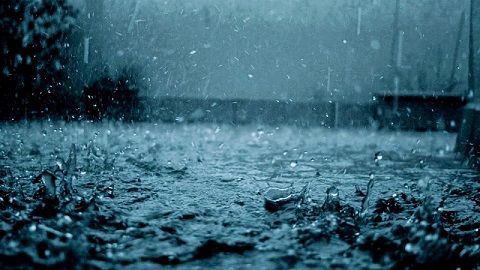
It was in the last week of April that I started day dreaming. I dreamt of a sky laden with rain clouds and rain just pouring. As I reside in Mumbai, there is only one way that the city recognizes that it has really rained: when all the trains and buses stop plying. I continued day dreaming through the month of May surrendering to the highest recorded temperatures for this month in a hundred years (as per the records). As June came I wondered why the monsoons have not started as yet. I talked with friends and we were thinking that city folk think about the monsoons as if they are like trains or flights which have to come at the specific appointed time. And if there is any delay, we wonder why someone is not up to their job.
Unbeknownst to us, rains are not decided by some time table or even by scientists. In India some efforts were made in that direction and after spending more than Rs.2 crores (US $350,000) they received less than 2mm of rains. The Bhagavad-gita clearly says, yajnad bhavati parjanyo: “Rains are produced by performance of yajna [sacrifice].” Why this connection with yajna? Does burning a handful of grains in fire constitute sacrifice?
The Vedic connection with rains is as follows: Man and other living entities are provided for by material nature, which works under the direction of the Supreme Lord, Sri Krishna . Lord Krishna has appointed various demigods like Indra, Candra, Varuna, Brahma to serve Him just as different limbs of the body serve the whole. They are like appointed officers who manage material affairs, and the Vedas advise sacrifices to satisfy these demigods so that they may be pleased to supply air, light and water sufficiently to produce food grains.
When devotees worship Sri Sri Radha-Krishna , all the demigods are also automatically worshiped; therefore there is no separate need to worship the demigods. Eating food which is offered in sacrifice nourishes us spiritually. By such action not only are past sinful reactions in the body vanquished, but the body becomes immunized to all contaminations of material nature. When there is an epidemic disease, an antiseptic vaccine protects a person from the attack of such an epidemic. Similarly, food offered to Lord Visnu and then consumed by us, makes us sufficiently resistant to material contamination.
Previously kings like Yudhisthira were so qualified that during their reign the clouds provided all the water that people needed, and the earth produced all the necessities of man in profusion. Due to its filled milk bag and cheerful attitude, the cow used to moisten the grazing ground with milk. And Yudhisthira’s saintly mother, Kunti Devi, was also very clear in her thinking when she said “All these cities and villages are flourishing in all respects because the herbs and grains are in abundance, the trees are full of fruits, the rivers are flowing, the hills are full of minerals and the oceans full of wealth. And this is all due to Your [Krishna ’s] glancing over them.”
Is it so difficult that in our age we cannot understand this or it does not work anymore? Understanding this is not difficult at all and it still works wherever sacrifice is performed. Even sacrifice is simplified for this age. We no longer need to burn huge quantities of ghee (clarified butter) and grains in ostentatious ceremonies. The yajna (sacrifice) recommended for this age is simple — the chanting of the maha-mantra: Hare Krishna Hare Krishna Krishna Krishna Hare Hare/ Hare Rama Hare Rama Rama Rama Hare Hare.
